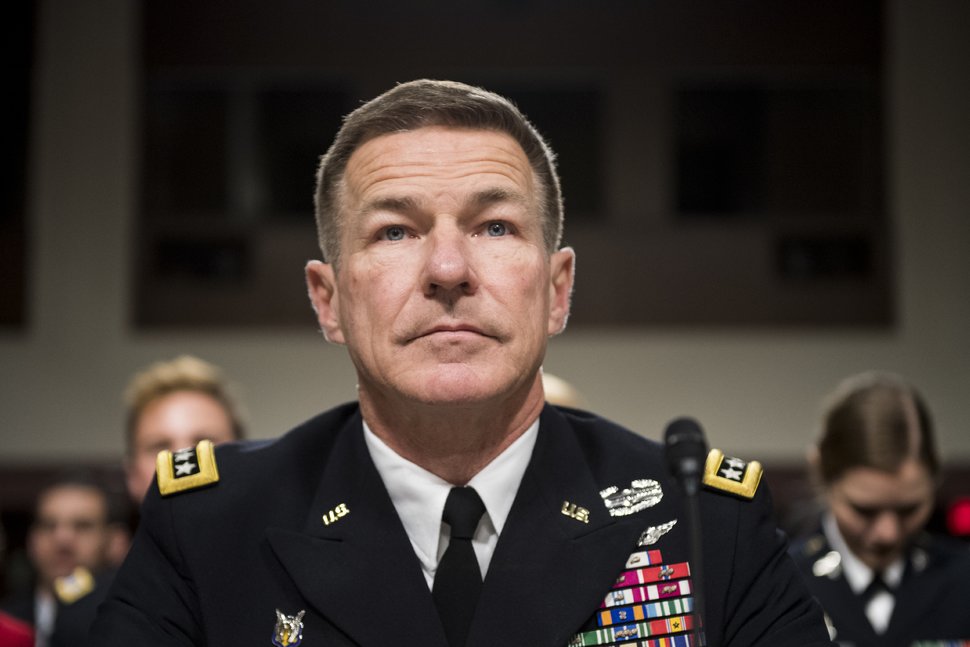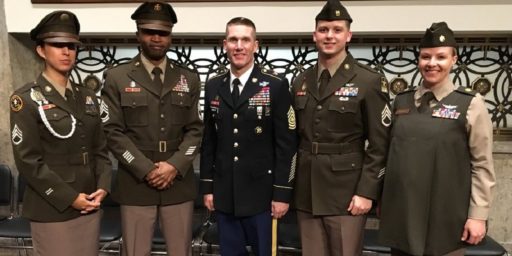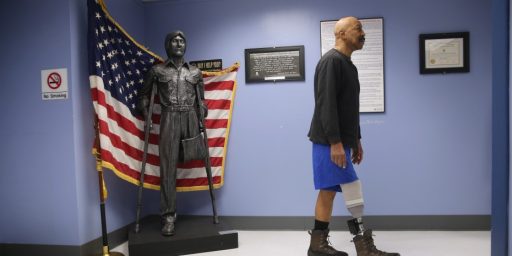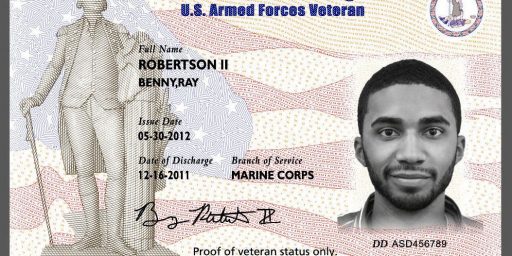McConville Hearings Highlight Military as Family Business
All three children of the next head of the Army are following in his footsteps.

Paul D. Shinkman, Senior National Security Writer for US News & World Report, points to an interesting tidbit from the confirmation hearings for the Army’s next Chief of Staff.
MEMBERS OF THE SENATE Armed Services Committee expressed almost unanimous acclaim for Army Gen. James McConville as he testified before them Thursday to become that service branch’s top officer, lauding a career so eminent that the committee chairman, Sen. Jim Inhofe, began the hearing by saying, “I can’t imagine there’s any opposition.”
McConville’s tenure was exemplified in stacks of badges and ribbons adorning his crisp service dress that glittered under the lights of the Senate chamber, but it wasn’t that particular uniform that caught the attention of the Oklahoma Republican and others on the dais.
“Who can vote against a guy, a distinguished general, who has two sons, a daughter – all three captains in the U.S. Army? I say, no one,” Inhofe said.
Indeed McConville, a Massachusetts native and West Point graduate, sat before a phalanx of Army uniforms worn by his three children and son-in-law, a sergeant. Among them, they have multiple combat and overseas tours, and tenures at graduate schools and elite military training facilities. Next to them was his wife Maria, who, though wearing a dress on Thursday, had previously served as an Army captain as well.
— “A Photo of a General’s Family Highlights Civil-Military Concerns“
That’s awesome, right?
But the McConville family’s presence on Thursday also represented what some suggest is a growing and troubling trend in the military regarding the demographics of those who choose to serve.
Since transitioning to an “all volunteer force” in the aftermath of the Vietnam War draft, Americans now serving in the U.S. military comprise less than 1 percent of the population. The number of U.S. military veterans continues to plummet from almost half the population in 1970 to 16 percent as of 2014, according to Pew Research.
And according to Pew’s most recent data, from 2011, uniformed service members are increasingly likely to come from a military family, more so than members of the general public. Seventy percent of veterans have an aunt or uncle with military experience, half have parents who served and 43 percent have siblings who did. Those numbers each fall by roughly 10 percent for Americans who never served in the military.
The biggest gap Pew identified was among veterans who have children in the military: 21 percent versus less than 10 percent among civilians.
I’m not sure comparable research is available but would my strong guess would be the offspring of farmers, plumbers, musicians, college professors, dentists—you name it—are more likely to go into the family business. I’d bet good money that it’s true of policemen and firefighters, who are more directly comparable to soldiers.
So, what’s the problem?
Military leaders have expressed concern in the past of the negative effects of too few Americans joining the military – or believing they should:
“The downside to having a professional army is you become a little insular and caste-like,” Stanley McChrystal, a former four-star general and commander of the war in Afghanistan, told U.S. News in January. He’s dedicated much of his career since retirement to promoting service opportunities among young people – in the military or through organizations like AmeriCorps and the Peace Corps – and regularly touts troubling statistics, including that only 30 percent of young people currently qualify to enter the military due factors like their health or prior criminal records.
I’ve been studying and writing about related issues for quite a long time now. See, for example, my 2005 debate with Phil Carter in the defunct Legal Times on the virtues of reinstating the draft and my 2011 essay in The American Conservative pushing back on the notion that professionalization of military service is particularly problematic. I’m just not persuaded that the McConville family’s tendency to dress alike represents a threat to the Republic.
Is it problematic that a goodly portion of our youth are obese and otherwise unhealthy? You betcha. But I’d put their ineligibility to enlist low on the reasons why.
Still, I do agree with critics on one issue:
Jim Mattis, the former defense secretary and four-star Marine general, co-edited a book on the subject, and routinely expressed concern about the “civ-mil divide” in public and private.
That concern was raised on Twitter in response to a photo of the McConville family.
“Is it OK to be cheering and depressed at the same time? This is awesome, and yet, 100 percent mil/civ divide in a single photo,” one user wrote on Twitter in response to a picture of McConville and his family. “We’re eating our own, recruiting is getting more and more insular.”
Another offered, “military service has become ‘the family business for some,’ and ‘that thing that other people do’ for others.”
I don’t mind that the McConville clan followed their parents into serving in the military. Hell, I followed my own father, who retired as an Army first sergeant. But I do find it worrisome that, as serving becomes seen as something other people do, we’ll stop caring about those dying in our wars—or even seeing them as our wars.
Still, as I’ve pointed out numerous times, including in a harsh book review for The National Interest back in 2013, the opposite has been the case thus far.
[T]here’s simply no evidence that the fact that “somebody else” is doing the fighting and dying has made us less sensitive to the loss of American sons and daughters. Far from it. We’re demonstrably much more sensitive to military casualties than we were during the most recent draft era and, indeed, any previous point in American history.
It’s true that the general public seems to be more-or-less obvious to the fact that we still have American troops fighting in Afghanistan, Syria, and dozens of other places. But that’s mostly because the death toll has slowed to a trickle. When troops were dying on a routine basis in Iraq and Afghanistan’s early years, the public paid rapt attention—with the name of every single dead American treated as a tragedy in a way never seen in Korea or Vietnam, where draftees died by the tens of thousands.
My far more real concern about the fact that such a small percentage of the population has served or has any direct connection with those who have is that it turns soldiers and veterans into mythical figures whose patriotism and wisdom must be bowed to. Indeed, less concerned that the general and his children showed up in the same uniform than that the head of the Senate Armed Services Committee—charged with evaluating McConville’s fitness to lead the Army—felt the need to suck up to them.






Even before the elimination of the draft it has been common that military service has been something of a tradition for many families. The most notable examples include families such as the George Patton had forebearers who served in the Civil War, for example, and Douglas MacArthur’s father also served in that conflict. The most famous family of recent vintage, of course, are the McCain’s, which has seen a “John S. McCain” serving in conflicts from World War One to the wars in Iraq and Afghanistan. I’m sure there are plenty of other examples of men (and women) who have served in less notable positions in the footsteps of their fathers (and, in future generations, mothers).
Nonetheless, your point that military service is no longer the seemingly universal thing it once was is valid as is the point that many of the people who do serve come from segments of the population that are underrepresented in Congress and the upper ranks.
@Doug Mataconis: Yes, you make a good point: Four-star generals are almost certainly more likely to have kids following in their footsteps than retired master sergeants and lieutenant colonels, let alone those like myself who return to civilian life after a single three- or four-year tour of duty.
@James Joyner:
That being said, I know several people in lower ranks who did the same thing. Especially when it comes to the children of members of the World War 2 generation. I’d be interested to know if the children of Korea and Vietnam vets have shown the same proclivity.
I see it as a good, and perhaps necessary, development that so few people want to risk their lives, not to mention being maimed and traumatized, in war. It’s certainly a lot better than the hordes of common people who volunteered in 1914, with much joy and excitement. Today this seems unseemly, even if back in the Summer of 1914 no one quite knew what they were getting into(*).
I’m glad James doesn’t bring up a military draft as a solution.
(*) It’s disingenuous to say that no one knew how bloody a war it would be, given the experiences of major wars in the XIX Century like the Boer War, the Crimean War (“Theirs not to make reply/Theirs not to reason why/Theirs but to do and die.”), and to top them all the US Civil War. No one seemed to have anticipated a long war, or a large stalemate in the Western Front, but they all knew it would be gruesome and bloody.
They just expected the bulk of the casualties to be borne by the other side, and they were all okay with that.
That families tend to serve, in of itself, isn’t troubling, the larger trend that James pointed out is. That those who choose to serve in the military have become increasingly smaller pool of citizens. A return of the draft would likely help that, but a better solution might be compulsory national service. That service could be in the military, the Peace Core, or domestic service agencies.
And then there is a segment in the circle of Irish life, in which the eldest son receives the farm or family business, the second son becomes a priest and any subsequent sons join some countries military.
@Sleeping Dog:
I vote no to both options. Nobody should be compelled to work for the state if they don’t want to. As Milton Friedman put it when he helped to bring about an end to the draft in the early 1970s, compulsory service of any kind is a denigration of individual liberty.
@Doug Mataconis:
Maybe we have too much individual liberty, and not enough community. People care far more about their ability to do something than how that affects other people.
You often see angry people shouting “I got rights!”, but very seldom do you see someone acknowledging “I got responsibilities!”
@Gustopher:
If you want to volunteer for the military, the Peace Corps, or some other form of national service that is your right. What you don’t have the right to do is force me, or anyone else, to do the same thing.
You are on to something, James. I would tie it into this:
And finally wrap it up in polls that show the military leaning far to the right.
Plato nailed it in The Republic: the military, while necessary, is a great risk to any nation. We send 18-year-old boys to kill, because ten years later they would not be as pliable. They are “noble dogs” who fight for their own but don’t exactly understand what they are really fighting for. Add in unseemly respect amongst the general population, right-wing propaganda, a highly polarized country, disfunctional Executive, Legislative and Judicial branches, a discredited and partisan fourth estate, and, to repeat, a military caste, and just what would any reasonable person expect from any place else in the world?
@Doug Mataconis: I assure you, you will be very happy doing your mandatory shift repairing the fences and digging trenches around the FEMA re-education camps. And if you aren’t happy, have I mentioned the FEMA re-education camps?
Seriously, though, I think we overindex on personal freedom for things where there are negative external consequences. Guns, polluting, driving down the street with too much bass playing from your car…
The only contribution most people make is taxes and jury duty, and they do their damnedest to get out of either and we celebrate it.
America: Land Of The Free And The Tragedy Of The Commons.
@Doug Mataconis: @Gustopher:
Doug, I understand your position and I’m not totally in disagreement with it, but my view is that we as citizens have a responsibility to our greater society and at times as Gustopher suggests, means limitations on individual liberty.
@Kathy: WWI: few adults could give even a vague summary of the various issues that caused that war. The involvement of the US can still be debated either way. As long as the leaders can put the families of other people out in the battlefield, then the problem remains. Even in the War Between the States, most of the Southern soldiers did not come from the plantation families. There is a lesson there somewhere.
We certainly are a very long way from, “…ask not what your country can do for you, ask what you can do for your country.”